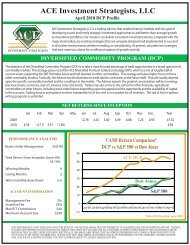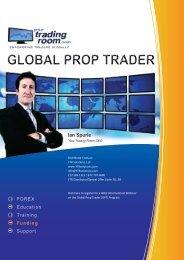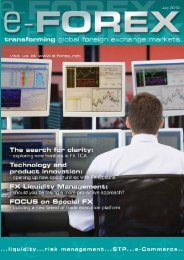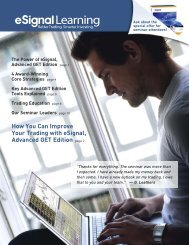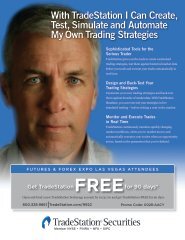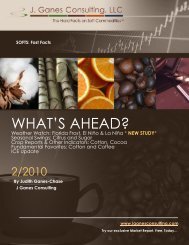Create successful ePaper yourself
Turn your PDF publications into a flip-book with our unique Google optimized e-Paper software.
ather than being subjected to single bank offerings<br />
with their limited pools of liquidity.<br />
Transaction Cost Analysis<br />
Such a development would also increase the demand<br />
for transaction cost analysis (TCA), a vital element in<br />
achieving best execution by showing the cost of each<br />
trade. These TCA services have be<strong>com</strong>e much indemand<br />
in the equities market and we are starting to<br />
see the same in the FX space, says Miesner. “TCA is<br />
be<strong>com</strong>ing more of a buzzword in FX although I’m<br />
not sure I’ve <strong>com</strong>e across anyone who has successfully<br />
implemented a TCA offering Going forward it is<br />
going to be a big area of interest particularly for the<br />
traditional asset managers that require it. These<br />
traditional asset managers will most likely just be<br />
accessing one or two venues and those<br />
venues will have to provide TCA,<br />
however the biggest stumbling block<br />
is that there are only a handful of<br />
venues that publish their<br />
volumes. When this barrier is<br />
broken down, then it will be a<br />
lot easier for TCA to flourish in<br />
the FX market.”<br />
Despite the mature status of<br />
DMA in other asset classes,<br />
notably equities, Integral’s Sandhu<br />
believes it is still in its relative<br />
infancy in terms of the FX market. “I<br />
don’t think most people in the FX market<br />
even use the DMA term. Although the equities<br />
market is fragmented, most trading is done at the<br />
major order-book venues, of which there are a<br />
limited number. These exchanges or ECNs and they<br />
all have central order books.<br />
They are generally homogenous in the way they offer<br />
execution. But in FX they are order books and OTC<br />
liquidity providers, lots of prices and lots of venues that<br />
are unregulated and all behave differently. It is DMA in<br />
an OTC world and to build an effective DMA tool you<br />
have to solve all of these issues. This is not to say that<br />
these equity-type services have not added something to<br />
the FX market but you cannot just transplant a service<br />
from one asset class into another.”<br />
Other major issues<br />
One of the major issues with DMA in the equities<br />
market is its state of independence. One of the early<br />
heralded benefits of DMA was the fact that it offered<br />
DMA - an increasingly attractive toolset for the FX buy-side<br />
a means to execution through an agency broker that<br />
bypassed the principal brokers. However when<br />
investment banks then offered their own DMA<br />
services or else bought out the independent<br />
providers, the waters were muddied somewhat as to<br />
what constitutes a true DMA service. According to<br />
Sandhu these same issues are now relevant in the FX<br />
market. “There are also those services that started off<br />
as a DMA provider – such as Currenex – that have<br />
now be<strong>com</strong>e venues in their own right with their<br />
own order book and their own liquidity pools rather<br />
than simply the plumbing to get to a host of<br />
independent sources. They are now <strong>com</strong>peting with<br />
Reuters, Hotspot FX and EBS.<br />
There are also banks now claiming that they are<br />
DMA providers, pretending to be agency<br />
brokers and offering to execute your<br />
orders. In an OTC market like FX,<br />
where there is no exchange, the<br />
banks are ultimately the primary<br />
sources of liquidity. It is not that<br />
the buy-side wants to avoid<br />
using the banks but they want<br />
to be able to access them all on<br />
an equal footing. Banks want<br />
their customers exclusively so<br />
they are offering DMA in the<br />
hope that some buy-side firms will<br />
just be looking to tick a box to say<br />
that they have a DMA tool without<br />
really knowing what a true DMA offering<br />
should be. As liquidity providers, banks won’t act as<br />
facilitator of DMA services. In fact, it would be<br />
unreasonable to assume for liquidity providers to<br />
provide DMA that would facilitate their customers’<br />
best execution efforts. As far as I’m concerned you<br />
can either be a principal or an agent but you cannot<br />
be both and a DMA offering can only be so if it<br />
<strong>com</strong>es from an agent. All those banks offering DMA<br />
that are not agency brokers are misrepresenting their<br />
goals to customers.”<br />
Nevertheless Sandhu is confident that the evolution of<br />
DMA will bring with it <strong>com</strong>plete transparency, truly<br />
aggregated pricing and clean trading and will be<strong>com</strong>e<br />
the normal means of execution for the interbank<br />
market at least. “This will mean that FX will start to<br />
look a lot like other asset classes and there will be<br />
three main participants – the banks; the agency<br />
service providers (true agency brokers); and customers<br />
who will learn to expect to be treated fairly.”<br />
january 2010 e-FOREX | 101




